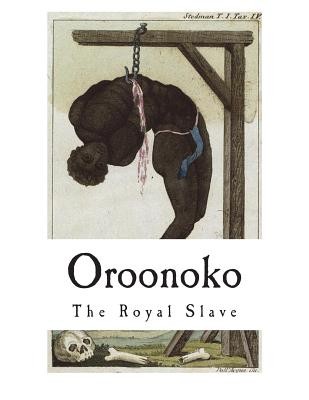
- We will send in 10–14 business days.
- Author: Aphra Behn
- Publisher: CreateSpace Independent Publishing Platform
- ISBN-10: 172239935X
- ISBN-13: 9781722399351
- Format: 21.6 x 27.9 x 0.2 cm, minkšti viršeliai
- Language: English
- SAVE -10% with code: EXTRA
Reviews
Description
Oroonoko or, the Royal Slave by Aphra Behn. Oroonoko: or, the Royal Slave is a short work of prose fiction by Aphra Behn (1640-1689), published in 1688 by William Canning and reissued with two other fictions later that year. The eponymous hero is an African prince from Coramantien who is tricked into slavery and sold to British colonists in Surinam where he meets the narrator. Behn's text is a first person account of his life, love, rebellion, and execution. Behn, often cited as the first known professional female writer, was a successful playwright, poet, translator and essayist. She began writing prose fiction in the 1680s, probably in response to the consolidation of theatres that led to a reduced need for new plays. Published less than a year before she died, Oroonoko is sometimes described as one of the earliest English novels. The narrator opens with an account of the colony of Surinam and its native people. Within this is a historical tale concerning the Coramantien grandson of an African king, Prince Oroonoko. At a very young age Prince Oroonoko was trained for battle and became an expert Captain by 17. During a battle the top General sacrifices himself for the Prince by taking an arrow for him. In sight of this event, the Prince takes the place of General. Oroonoko decides to honorably visit the daughter of the deceased general to offer the "Trophies of her Father's Victories", but he immediately falls in love with Imoinda and later ask for her hand in marriage.
- Author: Aphra Behn
- Publisher: CreateSpace Independent Publishing Platform
- ISBN-10: 172239935X
- ISBN-13: 9781722399351
- Format: 21.6 x 27.9 x 0.2 cm, minkšti viršeliai
- Language: English English
Oroonoko or, the Royal Slave by Aphra Behn. Oroonoko: or, the Royal Slave is a short work of prose fiction by Aphra Behn (1640-1689), published in 1688 by William Canning and reissued with two other fictions later that year. The eponymous hero is an African prince from Coramantien who is tricked into slavery and sold to British colonists in Surinam where he meets the narrator. Behn's text is a first person account of his life, love, rebellion, and execution. Behn, often cited as the first known professional female writer, was a successful playwright, poet, translator and essayist. She began writing prose fiction in the 1680s, probably in response to the consolidation of theatres that led to a reduced need for new plays. Published less than a year before she died, Oroonoko is sometimes described as one of the earliest English novels. The narrator opens with an account of the colony of Surinam and its native people. Within this is a historical tale concerning the Coramantien grandson of an African king, Prince Oroonoko. At a very young age Prince Oroonoko was trained for battle and became an expert Captain by 17. During a battle the top General sacrifices himself for the Prince by taking an arrow for him. In sight of this event, the Prince takes the place of General. Oroonoko decides to honorably visit the daughter of the deceased general to offer the "Trophies of her Father's Victories", but he immediately falls in love with Imoinda and later ask for her hand in marriage.


Reviews